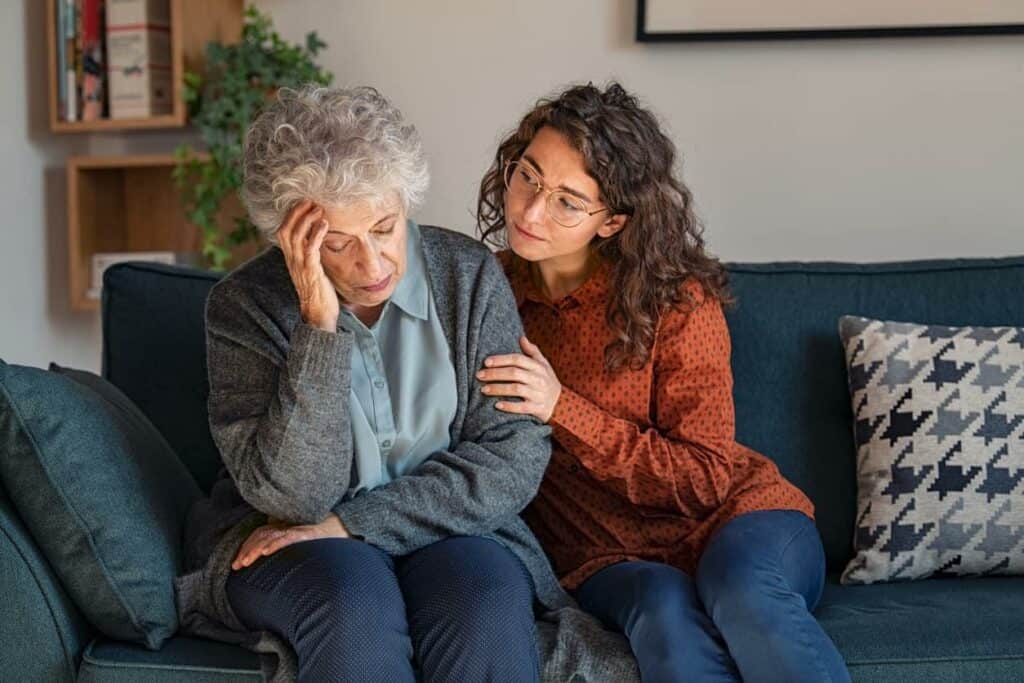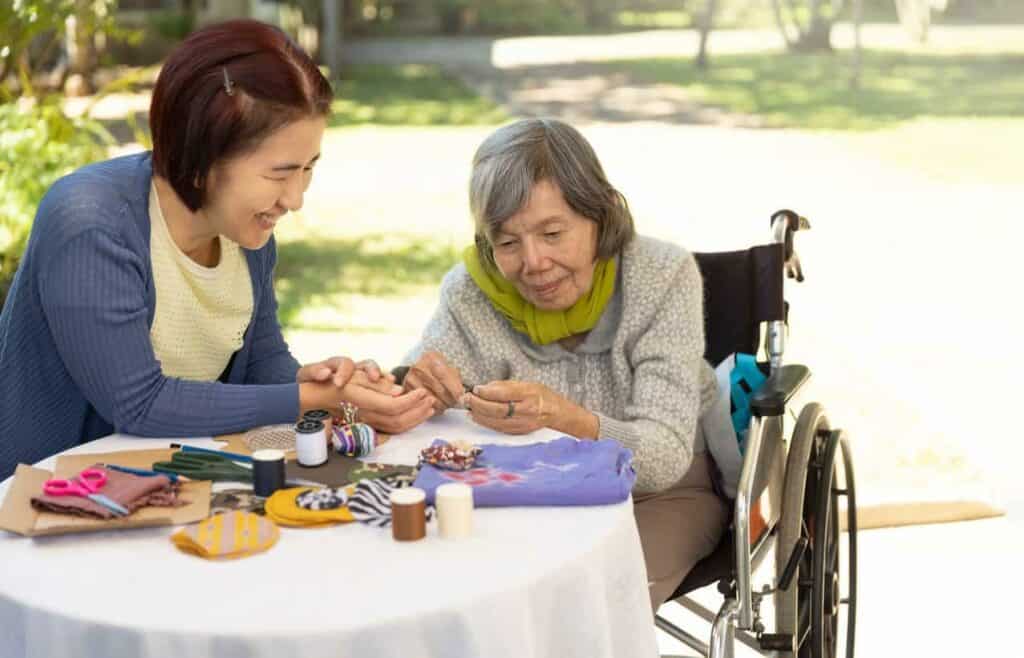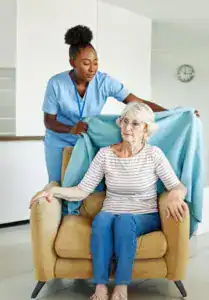
25+ Joyful Indoor Activities for Seniors That Will Transform Their Day
As seasons change in Reno and Carson City, or when mobility becomes a challenge, finding engaging indoor activities for seniors can feel like a difficult
When you have a loved one with dementia, it can be challenging to care for them. As a family caregiver, you need to understand that Alzheimer’s and other forms of dementia are progressive brain disorders that make it challenging for your loved one to remember things and people, communicate with you and others, take care of their daily tasks, and think clearly.
Additionally, dementia can change your loved one’s personality, mood swings, and behavior.
Understanding the stages of dementia your loved one may go through, will help you prepare psychologically, physically, and financially for it. Watching your aging parents lose their identity, struggle with memory loss, and not perform their daily activities can be frustrating and painful.
Sometimes, with dementia, there is confusion and fear, which can take a toll on the family. Knowing what to expect will help you cope and offer the necessary support when your loved one requires it.

Dementia is a term that describes a group of symptoms that lead to loss of clear thinking, problem-solving ability, memory, reasoning, and the ability to remember. These symptoms develop when diseases like Vascular or Alzheimer’s damage the brain enough to interfere with a person’s daily activities.
Dementia severity may range from the mild stage, when you notice some functioning failure in your loved one’s daily activity, to the severe stage, where a senior will have to completely depend on you and other family members with their activities of daily living, like dressing and feeding.
Dementia affects millions of people; it is not a part of aging, although it’s more prevalent in the senior population. When caring for a loved one, it can be difficult to know the stage of dementia they are in, but you can look out for some signs. Some of the signs to look out for are
You need to understand that dementia is a progressive brain disorder, with its symptoms worsening with time. Additionally, when a loved one loses one’s cognitive ability due to dementia, you should know that they will never recover that ability, and this means you should be mentally prepared to watch your loved one lose a part of themselves as dementia progresses. What is crucial is to be consistent, and strong, and support them.

There are several types of dementia. They include:
During this stage, your loved one will have normal outward behavior, and their quality of life will not be affected by dementia.
You or your loved one will not notice any symptoms. However, if you are concerned, you can start planning with your loved one.
There are some tools that your loved one can use to write down their priorities and values regarding the type of care they would like to have during the later stages of dementia.

During this stage, your loved one may not experience significant changes and will maintain their ability to perform various activities of their daily living. You may have to offer minimal support during this stage.
Some of the changes you will note will resemble the normal aging process. You can talk with your loved one about their changing abilities and work a plan for their future together. Some of the signs to look out for during this stage include:
Knowing that your loved one may feel overwhelmed and apprehensive about their uncertain future is crucial. Although you may have mixed emotions and fear for your loved one’s future, you need to remain strong and let them know they can count on you during the progression of dementia.
You can help your loved one plan for their future and let them write down their likes, priorities, and values. Additionally, it’s important to talk about the type of care they would like to have during the later stages of dementia.
You will notice some mild cognitive changes in a senior during this stage; when you see some changes in your loved ones’ reasoning and thinking, be keen, as this could be an indication of mild-stage dementia. Other signs that could be an indication of stage 3 dementia are:
During this stage, you can help your loved one retain their lifestyle by
During this stage, some mild or moderate changes in your loved one’s quality of life occur. At this stage, a senior will recall most of their past and even recognize their family and friends. Some of the signs that you can watch out for in stage 4 dementia include:
One way of preparing your loved one for this stage is by helping them plan for when their dementia deteriorates. You can help drive them around, meet with their healthcare provider, and assist them with activities of daily living.
A senior will likely remember some of their past and even recognize their family and friends. This stage is characterized by a moderate mental decline that impacts the quality of their lives.
Your loved one may have trouble making crucial decisions concerning their lives, like healthcare, legal, and finances.
When it comes to this stage, you will notice:
During this stage, it’s crucial to talk with your loved one’s healthcare provider and discuss the various available senior care options. Additionally, you can help your loved one by being patient and answering their questions whenever they ask.
This stage is characterized by severe cognitive decline, whereby your loved one fails to remember any of their past. They will also fail to recognize you and other family members and friends. At this stage, a senior may require full-time care at home. During this stage, you may notice the following:
It would help if you worked hand-in-hand with your loved ones’ healthcare team during this stage. You can also assist your loved one with daily living activities such as toileting, dressing, patiently answering their questions, and trying to connect with them by listening to their favorite music together.
Your loved one will experience very severe cognitive decline that will severely impact their lives. This stage calls for round-the-clock senior care as your loved one will:

Having a dementia diagnosis is one of the hardest things a senior and their family will have to face. For many families, this marks the beginning of an uncertain journey toward the unknown. However, you don’t have to panic; several resources will guide you during this challenging journey.
One way of dealing with dementia is by accepting and learning more about it. By doing this, you will equip yourself to face the challenges that accompany dementia during various stages. You can also look into assisted living as a senior care option for your loved one.
Assisted living is an ideal senior option, especially when your loved one is in the later stages of dementia. These facilities ensure their residents have the best care and stay healthy and comfortable.
At Amy’s Eden, our caregivers are trained to ensure each senior receives the care that best suits them. Our caregivers attend most of the Dementia and Alzheimer’s support groups, ensuring they are up to date with the current trends in senior care.

Caring for a senior with Alzheimer’s and other forms of dementia can be an exhausting experience. You want what is best for your loved one; their safety and comfort come first.
Sometimes, it may not be easy to provide the level of care your loved one requires, especially if you have to juggle work and your family. Choosing an assisted living home for your loved one can be one of the best decisions you can make regarding your loved one’s care plan.
When you engage the services of trained and specialized professionals, you and your loved one will reap the following benefits:
If you are considering an assisted living home as a care option for your loved one, look for one that specializes in dementia care. The benefits of trained and specialized care for your loved one can make an immense difference in their quality of life
At Amy’s Eden, we pride ourselves on providing unique and specialized dementia care to our residents. Our passionate caregivers help in providing holistic senior care to our dementia residents. We work hand-in-hand with your loved one’s healthcare providers, nutritionists, and specialists (physiotherapists, occupational therapists, psychologists, geriatricians, among others).
Assisted living homes provide meals, housing, and assistance with activities of daily living, which are essential to seniors. However, if you find an assisted living home providing dementia care, your loved one will have security as they may tend to wander off. Other benefits of moving your loved one to an assisted living home, especially if they have dementia, include the following:
Most assisted living homes offer safety features like a fenced compound, emergency-alert systems, keypad entries, doorbells indicating when a person exits or enters the premises, and staff that keeps checking on the residents to ensure they are fine.
Although amenities may vary depending on the different assisted living homes, most offer the following amenities:
Staff at an assisted living home are well trained and have the necessary experience in assisting residents with their daily tasks. However, staff at a memory or an assisted living home offering dementia care are trained to provide excellent memory care that is tailor-made to fit your loved one’s needs. This training and experience help your loved one maintain their cognitive skills for longer, a sense of themselves, and lead a quality lifestyle.
When your loved one moves into an assisted living home offering dementia care, they will benefit from memory care therapies and activities that are designed to help them. These activities and therapies focus mainly on sensory stimulation, structure, cultivating engagement, and ensuring your loved one gets direct sunlight as much as possible.
These activities aim to reduce the effects of sundowning in dementia residents. Additionally, these activities will help a senior sleep well and help them enjoy their days.
The Tailored Activities and Therapies Program (TAP) is an evidence-based senior care program for people with dementia and their caregivers. TAP is a program that you and your loved one can enjoy from the comfort of your home or at an assisted living or memory care facility.
This program provides health professionals and occupational therapists (OT) whose main focus is to identify the abilities and interests of people living with dementia. The OT will provide education on dementia and other diseases and develop an approach that helps caregivers use selected activities as part of their daily senior care routine.
TAP aims at providing long-term senior care to people with dementia and their caregivers, as this will reduce agitation and stress. This program is, in essence, a reasoning tool that helps in the rehabilitation of dementia. One of its strong points is the concrete and simple solutions to complex situations.

A dementia diagnosis is one of the hardest challenges you will face as a family, and you need to come up with a coping mechanism. You will face emotional and financial challenges, and you will need to be strong to support your loved one.
Dealing with conflicting emotions will be one challenge that you will have to overcome during your journey with a person living with dementia. Feelings of inadequacy, frustration, fear, grief, disbelief, and denial are some of the most common during the early stages of dementia for both you and your loved one.
During this stage, you should encourage your loved one to express themselves and pursue activities that interest them and add meaning and value to their lives. To face your fears and conflicting emotions, you should look for someone to confide in this can be a mental health therapist, or peers from online or physical support groups.
Research on dementia and find readily available resources, as they will help you provide effective and excellent dementia care. You can start by searching for Alzheimer’s or dementia associations in your area, as they will offer useful tips, advice, support, and training for you and your family.
Learn all you can about dementia, as this will greatly help you understand the changes in your loved one. Although dementia experiences differ with individuals, the more you learn about it, the better prepared you will be for the rough road ahead.

Communicating with your loved one when they have dementia can be challenging as they may have trouble remembering. A senior will easily become anxious, agitated, and even angry, especially when they think you are not paying close attention to what they are telling you.
In most cases, they may be saying the same thing over and over. In some instances, your loved one may have trouble with their speech and finding the right words during a conversation. This could lead to frustration, but you need to understand your loved one, and that dementia contributes to these communication challenges.
To help with communication, you can:
Despite doing everything in your power, caring for a person with dementia is challenging as the condition deteriorates with time. As time goes by, your loved one will depend more on you for their care. You will need all the support you can get to continue providing the best care to a senior. There are various ways you can take care of yourself while caring for a person with dementia:

While dementia experiences differ with each individual, the journey through all the stages almost follows the same path. Every stage of dementia comes with new symptoms, and sometimes the existing ones worsen. Knowing what to expect and look out for will help you care for your loved one better.
During the 7 stages of dementia before death, you should expect the following:
It’s almost impossible to know how long it will take a senior to go through all the seven stages of dementia before death. Since dementia symptoms deteriorate with time, you should be prepared as your loved one will continue to rely on you for their needs as the disease worsens over time.
If the idea of going through a dementia diagnosis seems overwhelming for you and your loved one, Amy’s Eden is here to help you navigate through this journey. Our compassionate caregivers will offer excellent dementia care and guide you in finding support groups near you, as this will make your journey easier. We offer free guidance, and we are willing and ready to discuss available dementia care options for your loved one. Contact us today to learn more about how we can help your loved one thrive regardless of dementia.
Get care >

As seasons change in Reno and Carson City, or when mobility becomes a challenge, finding engaging indoor activities for seniors can feel like a difficult
Family Survey Please share your honest feedback to help us improve the care and safety of your loved one.
Professional Senior In-Home Care in Carson City Keep your loved one in the comfort of their cherished home. Amy’s Eden delivers exceptional senior care services

The Best Home Care in Reno, NV The comfort of your home, the quality of Eden. We provide compassionate, professional in-home care services for seniors

Amy's Eden Senior Care © 2023